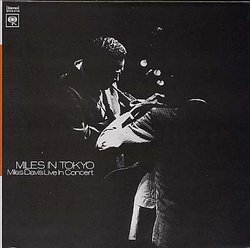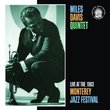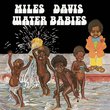| All Artists: Miles Davis Title: Miles in Tokyo Members Wishing: 1 Total Copies: 0 Label: Sony Japan Release Date: 12/21/2004 Album Type: Import, Original recording remastered Genres: Folk, Jazz, Pop Styles: Modern Postbebop, Bebop Number of Discs: 1 SwapaCD Credits: 1 |
Search - Miles Davis :: Miles in Tokyo
 | Miles Davis Miles in Tokyo Genres: Folk, Jazz, Pop
Japanese DSD mastered reissue of 1969 release for the late jazz icon. Packaged in a miniature gatefold LP sleeve for the first pressing only. 2001 release. |
Larger Image |
CD DetailsSynopsis
Album Description Japanese DSD mastered reissue of 1969 release for the late jazz icon. Packaged in a miniature gatefold LP sleeve for the first pressing only. 2001 release. Similar CDs
|
CD ReviewsMiles Davis starts to change his sound Ian Dankner | Bismark, North Dakota | 01/02/2006 (3 out of 5 stars) "Before buying this, you must be sure where you stand on the Miles Davis spectrum. If you're a fan of his earlier work with his first Quintet and are looking for that steady, consistent pulse, be forwarned, you won't find it here. At this point, Miles was starting to make progressive changes from his first group and, although it is much more mainstream compared to where he would soon be, the pulse is often times inconsistent and broken. In other words, the pulse is not consistent, the "feel" changes at least a few times over during the course of a piece. I'm only giving it 3 stars because, although this group is extremely tight, I'm a fan of the work he did with his first Quintet. Those that are fans of his second Quintet, would probably mark it higher. The only number where you'll find that steady, consistent pulse that reminisces his earlier playing is on the last track. Every other number, although old hat for him, goes through constant change to a point where it sometimes becomes unrecognizable and you can't follow it anymore. Fortunately, his group doesn't go too far out and, when they, do, it's usually only for a few bars before they go back in. The saxaphone player does most of the playing outside the form. The pianist, however, is phenomenal and he mostly stays inside the form. But, like I said, you have to know where you stand on the Miles Davis spectrum. If you like the work his second Quintet did, you'll be fine. If you're a fan of his first Quintet because of that steady, consistent pulse he establishes with that group, you'll only enjoy parts of the pieces, but not every part of the piece from beginning to end. This is the best warning I could give you." Miles Meets The New Thing - An IMPORTANT Recording for Stude Talking Wall | Queen Creek, AZ | 12/28/2008 (5 out of 5 stars) "Those who study Miles' career know that he was in something of a creative rut in the early 60's. The departure of Coltrane and later the Kelly, Chambers & Cobb rhythm section left Miles looking for a new creative pool of ideas and expression. The arrival of Carter, Hancock, Williams, and Coleman gave him a working band and while the music these guys made was exceedingly good, there was nothing extraordinarily new and exciting really happening. When Coleman vacated the tenor sax chair, Miles once again tried and failed to secure Wayne Shorter - the man Coltrane recommended to Miles when he departed. Enter Sam Rivers for a stint that lasted but a few weeks.
Rivers was recommended by the young Tony Williams. Note that Tony had also recommended Eric Dolphy but Miles was having none of that. What's interesting is Rivers and Dolphy, while they sound nothing alike and don't even play the same horn, approach the sax in much the same way. Both have a very expressive way of playing each and every note. While it's true that Rivers wasn't the player Miles was looking for, it is clear that his presence changed the way Miles' band listened to one another and played. Just listen to the version of "So What" on Tokyo and compare it to the recording made in Berlin a couple of months later with Wayne Shorter on sax. It's as if Miles made a giant leap forward on Tokyo and then took a step back. The rhythm section on Tokyo sounds much closer to what we hear on ESP than the first recording with Shorter (Berlin). Rivers is positively outrageous on So What, you've never heard a Miles Davis band that sounds like THAT. Another good reason for purchasing Tokyo is that is includes what biographer Chambers calls the essential performance of Funny Valentine. I have to agree with that assessment. Rivers might not have been the sax player Miles had in mind but it's clear that Rivers is the person who managed to nudge open the door to a much more flexible sound for Miles' 2nd great quartet. This is great stuff! Buy it!" |

 Track Listings (4) - Disc #1
Track Listings (4) - Disc #1
